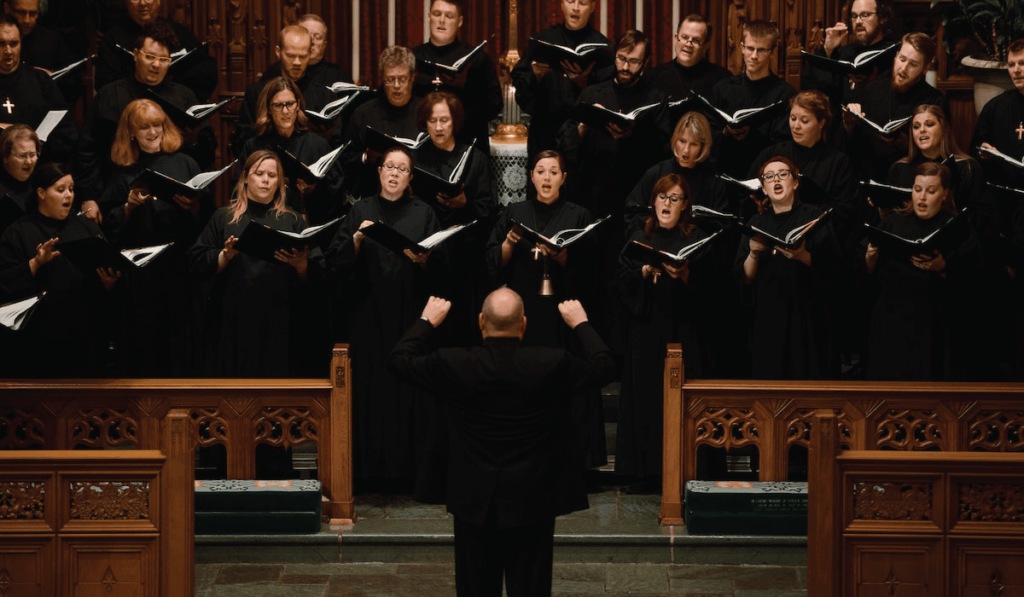by Jonathan A. Swett
With the vast wealth of hymns available to enhance our celebrations of the Christmas season each year, it is difficult to discern which hymns to select and when to stop selecting! If the church musician of your congregation is anything like me, they will find a way to creatively incorporate as many as possible. While it may be difficult to finalize and stop selecting hymns for your season, perhaps a place to start is with Martin Luther’s Christmas gem, “From Heaven Above to Earth I Come” (LSB 358). It most certainly should not be dismissed as “the hymn that has fifteen stanzas!” At my congregation this season, we will be using stanzas 1-7 of this hymn on Christmas Eve, stanzas 8-12 on the First Sunday after Christmas, and stanzas 13-15 on the Second Sunday after Christmas. There are also creative ways this hymn can be presented within the same service, even by singing all fifteen stanzas consecutively. It is not my recommendation to say: “Okay everybody, we are going to sing ALL fifteen stanzas ALL together. Ready, go!”
As with some of Luther’s other hymns, “From Heaven Above to Earth I Come” is in part derived from a popular song of his day—in this case a singing game. In Liturgy and Hymns (volume LIII of Luther’s Works), Ulrich Siegfried Leupold (editor) notes that the first stanza is based on an old garland song refrain that was sung by a young man before giving out a riddle to one of the girls in the circle. If she could not solve the riddle she had to give the singer her wreath or garland. In The Roots of German Hymnody, Konrad Ameln provides the German text of both the original garland song and Luther’s first stanza. It is interesting to compare Leupold’s translation of the garland song (left) with Catherine Winkworth’s translation of Luther (right):
| Good news from far abroad I bring Glad tidings for you all I sing, I bring so much you’d like to know, Much more than I shall tell you though. | “From heaven above to earth I come To bear good news to ev’ry home; Glad tidings of great joy I bring, Whereof I now will say and sing.” (public domain) |
This is the first of five stanzas that Luther penned as the angel’s proclamation of the joyful words of the wondrous news of Jesus’ birth. A note accompanying the hymn in Lutheran Service Book further enlightens: “The remaining stanzas declare the response of the shepherds and the meaning of the Savior’s birth for all the world.” The hymn was written for Luther’s family celebration of Christmas Eve and was first printed Joseph Klug’s Geistliche Lieder in Wittenberg in 1535.
I admire the beauty and clarity of the English translation; however, I must admit the first phrase of stanza eleven, “Instead of soft and silken stuff You have but hay and straw so rough” makes me chuckle a little. I have not tried, but am willing to say it would be quite a difficult task to find the word “stuff” used in any other hymn. If I was preparing the translation, I would have worked hard to stay faithful to the original language while finding a different choice of vocabulary in this instance. Yet, the more I try to draft an alternative to the first phrase and a second phrase to match the rhyme scheme, the more I realize this task is easier said than done! Here are a couple of my meager efforts for your amusement:
| Without rare soft and silken cloth, You lay on straw inside a trough. | Not velvets soft or silken things, It’s hay and straw for You they bring. |
Originally sung to a folk song melody, the tune now married with “From Heaven Above to Earth I Come” is Vom Himmel hoch, as found in Valentin Schumann’s Geistliche lieder auffs new gebessert und gemehrt published in Leipzig in 1539, and believed to have been written by Luther himself. Numerous instrumental and choral settings of the text and tune exist and are worthy of seeking out. Perhaps most famously, J.S. Bach used the tune in his Christmas Oratorio and several independent works for organ.
I pray that you will find a new appreciation for this wonderful Christmas hymn and an even greater joy in the good news and purpose for which the angel declared, “From heaven above to earth I come.” From heaven above to earth came JESUS, the Word made Flesh, the Savior of the world!
Jonathan A. Swett is Kantor of Our Savior Evangelical Lutheran Church and School in Hartland, MI.

